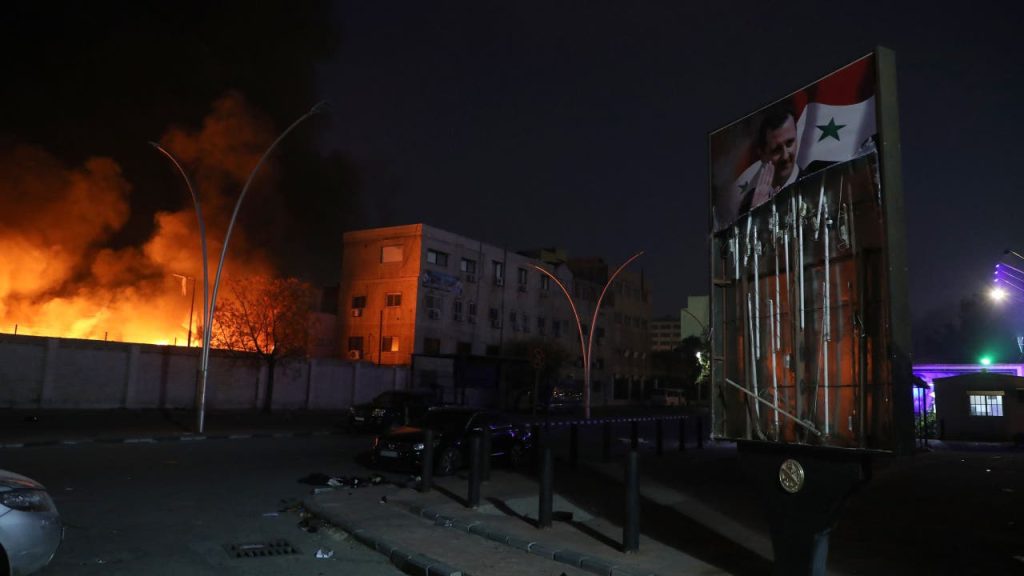Biden: ‘U.S. conducts strikes in Syria’
President Joe Biden said he ordered strikes in Syria, targeting ISIS. According to AP News, ousted Syrian Leader Bashar Assad is in Moscow and was given asylum.
Syria’s President Bashar Assad reportedly fled to Russia Sunday after opposition forces toppled his regime, bringing to a dramatic close his nearly 14-year struggle to hold onto control.
Russia’s Foreign Ministry claimed Sunday that Assad had left Syria after negotiations with rebel groups, and gave “instructions” to “transfer power peacefully.” Russian media later reported that Assad and his family fled to Moscow and are being given asylum.
President Joe Biden said the sudden collapse of Assad’s regime is a “fundamental act of justice” after decades of repression, but it was “a moment of risk and uncertainty” for the Mideast. The swiftly moving events have raised questions about the future of the country and the wider region.
Speaking at the White House, Biden credited action by the U.S. and its allies for weakening Syria’s backers — Russia, Iran and Hezbollah. He said “for the first time” that they could no longer defend Assad’s grip on power.
“Our approach has shifted the balance of power in the Middle East,” Biden said.
Russia has waged a military campaign in Syria since September 2015, teaming up with Iran to allow Assad’s government to fight armed opposition groups and reclaim control over most of the country.
A damaged poster of Bashar al-Assad is seen as a fire burns at a security compound that houses the Syrian Military Intelligence Interrogation Division, on December 8, 2024 in Damascus, Syria. (Photo by Ali Haj Suleiman/Getty Images)
Joyful crowds gathered in squares in Damascus, waving the Syrian revolutionary flag in scenes that recalled the early days of the Arab Spring uprising, before a brutal crackdown and the rise of an insurgency plunged the country into a nearly 14-year civil war.
Others gleefully ransacked the presidential palace and residence after Assad and other top officials vanished.
Abu Mohammed al-Golani, a former al-Qaida commander who cut ties with the group years ago and says he embraces pluralism and religious tolerance, leads the biggest rebel faction and is poised to chart the country’s future.
Assad’s downfall
Syria latest: President Assad flees after rebels seize
Syria rebels claim Damascus, ending Bashar al-Assad’s 24-year authoritarian rule. Israeli Prime Minister Benjamin Netanyahu said the fall of Assad was a ‘direct result of blows dealt to Hezbollah & Iran by Israel.’
Assad’s exit stood in stark contrast to his first months as Syria’s unlikely president in 2000, when many hoped he would be a young reformer after three decades of his father’s iron grip. Only 34 years old, the Western-educated ophthalmologist appeared as a geeky tech-savvy fan of computers with a gentle demeanor.
But when faced with protests against his rule that erupted in March 2011, Assad turned to the brutal tactics of his father in an attempt to crush dissent. As the uprising hemorrhaged into an outright civil war, he unleashed his military to blast opposition-held cities, with support from allies Iran and Russia.
International rights groups and prosecutors alleged widespread use of torture and extrajudicial killings in Syria’s government-run detention centers. The war has killed nearly half a million people and displaced half of the country’s prewar population of 23 million.

Syrians pose with a vandalized statue of Hafez al-Assad, father of Bashar al-Assad, in Umayyad Square on December 8, 2024 in Damascus, Syria. (Photo by Ali Haj Suleiman/Getty Images)
The conflict appeared to be frozen in recent years, with Assad’s government regaining control of most of Syria’s territory while the northwest remained under the control of opposition groups and the northeast under Kurdish control.
RELATED: Officials say Russia plotted to put incendiary packages on planes headed to US
Although Damascus remained under crippling Western sanctions, neighboring countries had begun to resign themselves to Assad’s continued hold on power. The Arab League reinstated Syria’s membership last year, and Saudi Arabia in May announced the appointment of its first ambassador since severing ties with Damascus 12 years ago.
However, the geopolitical tide turned quickly when opposition groups in northwest Syria in late November launched a surprise offensive. Government forces quickly collapsed while Assad’s allies, preoccupied by other conflicts — Russia’s war in Ukraine and the yearlong wars between Israel and the Iran-backed militant groups Hezbollah and Hamas — appeared reluctant to forcefully intervene.

